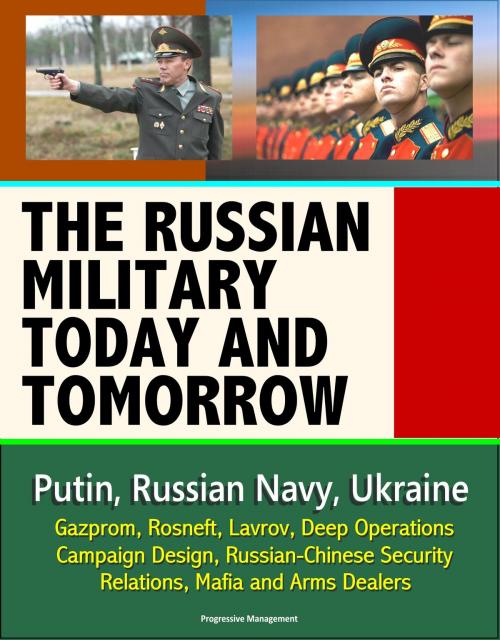The Russian Military Today and Tomorrow: Putin, Russian Navy, Ukraine, Gazprom, Rosneft, Lavrov, Deep Operations, Campaign Design, Russian-Chinese Security Relations, Mafia and Arms Dealers
Nonfiction, History, Asian, Russia| Author: | Progressive Management | ISBN: | 9781310172106 |
| Publisher: | Progressive Management | Publication: | March 18, 2014 |
| Imprint: | Smashwords Edition | Language: | English |
| Author: | Progressive Management |
| ISBN: | 9781310172106 |
| Publisher: | Progressive Management |
| Publication: | March 18, 2014 |
| Imprint: | Smashwords Edition |
| Language: | English |
Two excellent studies from the U.S. Army's Strategic Studies Institute provide unique insights into the current state of the Russian military. Topics and subjects covered include: Putin's Navy, Ukraine, Gazprom, Rosneft, the Russian-Georgian Conflict, Russian-Chinese Security Relations, Lavrov, Iran, Chechnya, Russian Mafia and Arms Dealers, Blitzkrieg, Deep Operations, campaign design, Russian Strategic Nuclear Forces, South Ossetia, Siloviki, Yukos, and more.
The Russian Military Today and Tomorrow - Contents include: 1. "No Need to Threaten Us, We Are Frightened of Ourselves," Russia's Blueprint for a Police State, The New Security Strategy * 2. Is Military Reform in Russia for "Real"? Yes, But * 3. Operational Art and the Curious Narrative on the Russian Contribution: Presence and Absence Over the Last 2 Decades. * 4. Russian Information Warfare Theory: The Consequences of August 2008 * 5. Russian Strategic Nuclear Forces and Arms Control: Deja Vu All Over Again * 6. The Challenge of Understanding the Russian Navy * 7. Russian Military Challenges Toward Central-East Europe * 8. Russian-Chinese Security Relations: Constant and Changing - Western interest in this field sharply declined after the fall of the Soviet Union and the end of the Cold War. To many, the issues and questions involved in this field, not to mention the effort connected with obtaining funding for such study, seemed to be irrelevant and not worth the time spent in doing so. Yet, recent events have shown that this approach is seriously misguided and involves major costs to the United States and its allies. Of course, it is by now a truism to say that the Russo-Georgian war of 2008 demonstrated to all observers that "Russia was back," if they had not realized that before. But in fact, as Stephen Blank points out in Chapter 2, Russian military and political leaders well before then believed that Russia was at risk in both military and nonmilitary ways. Some went so far as to say that the country was, in effect, already in an information war against the West. We often underestimate the impact of the Russian leadership's perception that Russia is intrinsically at risk, and in some sense under attack, from the West. That underestimation leads us astray, conceptually but also politically. It causes us to ignore some of the most vital and foundational issues in Russian defense policy, e.g., the relationship between the military and the civilian government and the importance of doctrinal statements and threat assessments.
Civil-Military Relations in Medvedev's Russia - The Russian military has successfully persuaded the government to accept its expansive concept of the threats to Russia, i.e., its threat assessment. That threat assessment is one that postulates growing military threats from without, mainly from the United States and the North Atlantic Treaty Organization (NATO), an increased likelihood of the incidence of war, and, in general, a presupposition of political, if not military, conflict with the West that preserves the state of siege in world politics inaugurated by Vladimir Lenin. Moreover, this threat assessment also postulates increasing domestic threats to the security of the present political order and links those threats, as would a Leninist approach, to the same external adversaries, if not enemies, postulated in the external threat assessment. Yet despite this structural militarization of Russia's cognitive and policy approach to its security dilemmas, the military has only partly succeeded in convincing the government to accept its answers to these dilemmas. Those answers essentially entail returning to a form of mobilization even though defense spending, in a bow to the military, will reach unprecedented levels in 2010 despite the current economic crisis.
Two excellent studies from the U.S. Army's Strategic Studies Institute provide unique insights into the current state of the Russian military. Topics and subjects covered include: Putin's Navy, Ukraine, Gazprom, Rosneft, the Russian-Georgian Conflict, Russian-Chinese Security Relations, Lavrov, Iran, Chechnya, Russian Mafia and Arms Dealers, Blitzkrieg, Deep Operations, campaign design, Russian Strategic Nuclear Forces, South Ossetia, Siloviki, Yukos, and more.
The Russian Military Today and Tomorrow - Contents include: 1. "No Need to Threaten Us, We Are Frightened of Ourselves," Russia's Blueprint for a Police State, The New Security Strategy * 2. Is Military Reform in Russia for "Real"? Yes, But * 3. Operational Art and the Curious Narrative on the Russian Contribution: Presence and Absence Over the Last 2 Decades. * 4. Russian Information Warfare Theory: The Consequences of August 2008 * 5. Russian Strategic Nuclear Forces and Arms Control: Deja Vu All Over Again * 6. The Challenge of Understanding the Russian Navy * 7. Russian Military Challenges Toward Central-East Europe * 8. Russian-Chinese Security Relations: Constant and Changing - Western interest in this field sharply declined after the fall of the Soviet Union and the end of the Cold War. To many, the issues and questions involved in this field, not to mention the effort connected with obtaining funding for such study, seemed to be irrelevant and not worth the time spent in doing so. Yet, recent events have shown that this approach is seriously misguided and involves major costs to the United States and its allies. Of course, it is by now a truism to say that the Russo-Georgian war of 2008 demonstrated to all observers that "Russia was back," if they had not realized that before. But in fact, as Stephen Blank points out in Chapter 2, Russian military and political leaders well before then believed that Russia was at risk in both military and nonmilitary ways. Some went so far as to say that the country was, in effect, already in an information war against the West. We often underestimate the impact of the Russian leadership's perception that Russia is intrinsically at risk, and in some sense under attack, from the West. That underestimation leads us astray, conceptually but also politically. It causes us to ignore some of the most vital and foundational issues in Russian defense policy, e.g., the relationship between the military and the civilian government and the importance of doctrinal statements and threat assessments.
Civil-Military Relations in Medvedev's Russia - The Russian military has successfully persuaded the government to accept its expansive concept of the threats to Russia, i.e., its threat assessment. That threat assessment is one that postulates growing military threats from without, mainly from the United States and the North Atlantic Treaty Organization (NATO), an increased likelihood of the incidence of war, and, in general, a presupposition of political, if not military, conflict with the West that preserves the state of siege in world politics inaugurated by Vladimir Lenin. Moreover, this threat assessment also postulates increasing domestic threats to the security of the present political order and links those threats, as would a Leninist approach, to the same external adversaries, if not enemies, postulated in the external threat assessment. Yet despite this structural militarization of Russia's cognitive and policy approach to its security dilemmas, the military has only partly succeeded in convincing the government to accept its answers to these dilemmas. Those answers essentially entail returning to a form of mobilization even though defense spending, in a bow to the military, will reach unprecedented levels in 2010 despite the current economic crisis.















